Presidential Candidates 2016
- Home
- Presidential Candidates 2016
*Note: The views expressed by the authors on this website do not necessarily reflect the views of this website.
While we are still a good six months away from the first caucuses, it’s announcement season; so, it’s time to start discussing the 2016 Presidential Election.
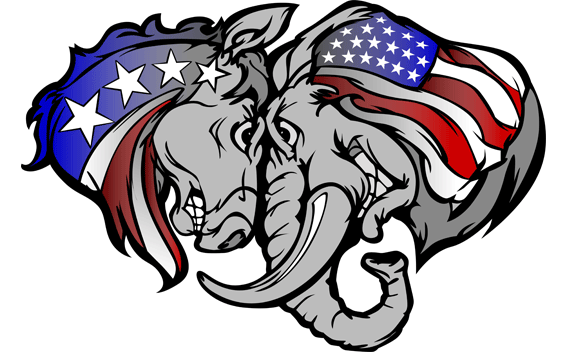
History repeats itself, though rarely does it do so quite this neatly. A Bush vs. Clinton rematch of the 1992 election is potentially in the works; and, what do you know, there’s a certain R. Paul lurking in the Republican primaries.
Despite the familial nostalgia in the headlines, this is very much a modern election. The 1992 election featured Bill Clinton denying that he inhaled, and yet widespread marijuana legalization will be a major issue this time around. This Clinton is no “Comeback Kid” either, but rather the overwhelming favorite, and while Clinton/Gore used a nationwide bus tour to build momentum, this race’s crucial campaign blitzing will happen online rather than on the road.
Before we dive into the pool of candidates, let’s examine the issues that will dominate your ears for the next 18 months:
Social
Fiscal
Foreign Policy
Climate Change
.
Social
Gay Marriage
- The recent Supreme Court decision ruling gay marriage legal throughout the country has ensured that this issue will be front and center during the election cycle. The key with this issue is that it is as much a state’s rights issue as a LGBT issue. This is also an issue that will likely have a clean divide between the parties, with the GOP railing against it, and the Dems championing the decision.
Marijuana Legalization
- With California looking ready to be the decisive West Coast domino, and Massachusetts gearing up to be the East Coast catalyst, marijuana legalization is widely considered inevitable at this point. The marijuana question can no longer be easily dismissed by campaigners, though some are still prone to hyperbole. While the issue will not decide any elections, it could be used strategically by candidates, especially from the Republican party, in demographic maneuvering.
Other: Gun Control, Abortion, Stem Cell Research, Gender-based income inequality
.
Fiscal
Upward Mobility/ Economic Inequality
- America has long upheld itself as the “Land of Opportunity.” However, recently this title has fallen under attack by some of its own citizens, who claim that a rigged system prevents upward social and economic mobility. Whether or not these concerns are valid, they will be a major talking point in the election, with Democrats aiming to use this to their advantage. The gap between the “1%” and, well, every other percent, will continue to be a point of contention despite tensions having eased in the last two years. Mitt Romney torpedoed his own Presidential campaign with comments on this topic in 2012. This time around Republicans will undoubtedly seek to choose a candidate that the general public feels they can relate to. This is an image that George W. successfully pulled off, despite being part of a dynastic political family, so can Jeb pull off the same feat?
Wage stagnation
- While this ties in strongly to the previous issue, in and of itself it will be a major talking point, especially for Democrats. While the economy has begun a slow recovery from the 2008 recession, albeit slowly, income levels have seemingly stagnated across the board. The focus has been on the middle class specifically. Low wages contribute to both small-scale social and large-scale economic unrest, inflaming this issue for candidates. The economy cannot make a full recovery until this problem is addressed.
Other: Jobs, Deficit
.
Foreign Policy
- This issue is the recipient of the quadrennial “Issue of the Election Award”. After eight long years of political conversations being dominated by talk of recession, jobs, buyouts, and “the 1%”, we can now look forward to being suffocated with talk of ISIS and Syria, Putin, and North Korea. This is a bit of a Catch-22 for the GOP as foreign policy has been widely perceived as Obama’s greatest weakness, an argument augmented by the fact that Hillary was his Secretary of State; however, very few of the Republican presidential candidates have meaningful foreign policy experience.
Russia
- Relations with America’s favorite ally/enemy (there really should be a word for this; allenemy?) have devolved to a point of uncomfortable shakiness at best, and potential devastation at worst. As the Russian Federation has militarily threatened the sovereignty of surrounding ex-satellite states, the US has grown increasingly frustrated with its volatile, enigmatic, and autocratic leader, the infamous Mr. Putin. Russian tension has indirectly led to an attempt to improve relations with Cuba, which will be an entirely separate talking point come election time. Despite the strained relationship, taming the ever-evolving threat that is the Middle East would be a task greatly aided by our UN Security Council partner. How the various candidates deal with Putin and the threat of an armed and aggressive Russia may be one of the tightest ropes Presidential hopefuls must walk on the campaign trail, and one of the truly important duties for the 45th President.
Iran
- Iran can also be labeled with our freshly coined “allenemy” title. Yet again, the disjointed and confusing problems in the Middle East has led to the US siding with nations on some issues, while strongly opposing them on others. Never is this more true than with Iran. While the US disagrees with a number of the stances Iran has taken in regards to Middle Eastern diplomacy, they are critical to taming the Islamic State (or ISIS, or ISIL, if you’re into acronyms). We have also recently considered direct negotiation with Tehran in regards to Iraq’s deteriorating political situation. This comes on the heels of the nuclear agreement between the two nations, which is still being hotly negotiated. The US must continue to be wary of alienating ally Saudi Arabia, and the Sunnis as a whole; but these could be the first steps in forming an alliance, or at least an agreement to disagree of sorts. Candidates must decide if they support this path towards functional partnership, or if we have conceded too much and must re-establish our power in the region.
Islamic State of Iraq and Syria
- While this topic has been strongly intertwined with the two preceding it, it deserves its own section. ISIS has replaced Al-Queda as the world’s leading terrorist threat to international security. While they have not executed an operation as effective and impactful as the 9/11 attacks, the vicious brutality with which they conduct their business has captured the world’s attention. While the nation is wary of engaging in another borderless ground war, the need for action has been championed in Washington. An AUMF (Authorization for Use of Military Force) is currently being worked out on Capitol Hill as officials continue to debate how best to approach this problem. Candidates will likely be asked their exact plan of action to deal with this enemy. A fine line will be walked between passivity and intensity reminiscent of George W.’s ill-fated foray into Iraq.
Immigration
- On the safer side of foreign policy is immigration, decidedly less threatening than the aforementioned issues, but a talking point nonetheless. Obama’s attempted executive action protecting four million immigrants from deportation has breathed new life into an issue that has been talked to death without significant action. Conservatives have predictably come out in strong opposition of the action, questioning both the merit behind it and the Obama’s power to execute such an order. While there are many facets to the immigration issue as a whole, the executive order will undoubtedly be a talking point of the campaign cycle, regardless of whether it translates into action or not. Conservatives may even use this as an example of Democratic abuse of power rather than in regards to actual immigration policy.
Other: Cuban relations, North Korean leadership, European economy, China/India future, Israel
.
Climate Change
- It is becoming increasingly difficult for conservatives to deny the presence of climate change, and global warming in particular. In the face of overwhelming scientific evidence, many have changed their stance from flat-out denial to acknowledging the presence of climate change while denying human involvement. It’ll be interesting to see if the GOP is willing to nominate a candidate who is more progressive on this issue.
Phew, well that was exhausting. Let’s lighten the mood a bit with some political comedy before we begin discussing candidates.
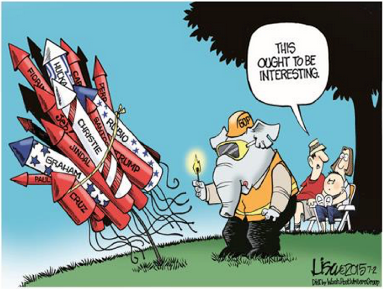
One of these has to work.
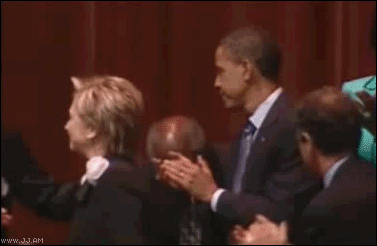
Well at least Hillary’s gotten over her awkward stage….
OK, well at least she’s not this awkward. (Also O’Reilly really needs to tone it down here, it’s just the wave Bill)

Please just be honest this time, we can take it.
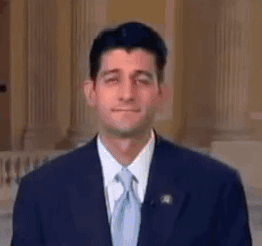
Mr. Ryan did not find this section amusing.
Speaking of which, where is Paul Ryan?!? Ryan is young, charismatic, and experienced. He brings a breath of youthfulness to a system that often has trouble connecting with the younger demographic. Sure he’s a bit green in the tooth, but I thought Obama bucked that trend. Ryan, however, is in such a prime position that he has significant political maneuverability. He is viewed favorably by both the party and the general public. Another four to eight years in Congress, where he recently became Chairman of the Ways and Means Committee, may be just enough seasoning to make him the frontrunner in the next Presidential cycle. In the meantime, you can be sure to catch him putting his gravitas to good use for other candidates once the campaign trail heats up.
Alright that was fun, now, BACK TO WORK!
We will examine each pool of candidates by party, breaking them down into the Frontrunner, the Contenders and the Pretenders. We will then analyze each candidate based on their résumé, stances on the issues, and electability. The amount of ink (or pixels) devoted to each candidate will fall in line with their likelihood of nomination.
Let’s start with the challenger! After being excluded from the Oval Office for eight long years and coming off a robust reclamation of the legislative branch, the GOP is ready to take back its early millennium throne.
GOP:
Frontrunner
Contenders
Pretenders
.
Frontrunner:
Jeb Bush
Résumé
- Governor of Florida from 1999-2007
- Father George Bush was 41st President of the United States
- Brother George W. Bush was 43rd President of the United States
On the Issues
Social
- While he opposes gay marriage, Bush has used kinder rhetoric on the issue than other Conservative candidates. He has at least acknowledged that there are same sex couples, and has hinted that they eventually should be allotted similar benefits to those of straight married couples. Make no mistake, he believes marriage should be between a man and a woman, but even hushed acknowledgment of gay unions can make a Republican candidate gay-friendly. Bush has also stated that he believes the decision should be left to the states. Jeb has admitted to smoking marijuana in the past, specifically while a student in Andover, Massachusetts. At the same time he opposes the legalization of marijuana, even on medicinal grounds. He opposed a proposed amendment in Florida that would have legalized medical marijuana. While his past may paint him as at least somewhat pro-marijuana compared to other GOP candidates, his stance has opened him up to charges of hypocrisy from his opponents. Again, he believes the decision and enforcement ultimately should be up to the states. Bush falls in with the party line, taking a firm stand against gun control and abortion. Bush has deep roots in education reform, which was one of his highest achievements in Florida. He is also one of the developers of Common Core, a program to standardize academic standards in art/literacy and mathematics that has been adopted by 43 states. This program has recently fallen out of favor with the GOP.
Fiscal
- Jeb’s “Right to Rise” economic campaign has centered around economic inequality. He tends to fall left of the majority of his Republican counterparts in regards to economic issues. The figure 4% job growth has also been a common refrain from Bush in regards to his economic policy. While Jeb often looked to cut taxes during his governorship and will receive heavy pressure from the GOP to include this in his policy plans, he is aware of the damage that Mitt Romney’s over-the-top tax plan did to his campaign. Bush has instead focused on a “broken” tax system, rather than out-and-out cuts. Education and opportunity have been also been key in Bush’s fiscal rhetoric so far, and will likely continue to be.
Foreign Policy
- When it comes to foreign policy, Jeb will likely look to position himself in between his hawkish brother and more moderate father. Bush opposes improved relations with Cuba, rather suggesting stronger economic sanctions. He has also voiced his displeasure with the Iran nuclear agreement and shown strong support for Israel. In regards to ISIS, he has advocated the need to effectively eliminate this security threat but has stopped short of committing US ground troops to such a task. The stain of the Iraq War will never fully be wiped clean from the Bush name. Jeb must distance himself from his brother in this regard while avoiding alienating hawk Republicans. Bush has been among the most liberal GOP candidates when it comes to immigration, even suggesting a path to citizenship.
Climate Change
- Jeb has acknowledged that the climate is changing and that human actions have played a part, placing him firmly on the far left of conservatives. At the same time, Jeb has cautioned against allowing panic over the environment to lead to industrial stagnation.
Electability
- The Bush family name is the ultimate gift and curse for little brother Jeb. While the dynasty affords him a wide, diverse array of advisors and fundraisers, his father, and especially his brother, don’t have the most promising Presidential track records in the eyes of voters. George the original doesn’t have the most sterling reputation within the party, while George W. ended his presidency with a 34% approval rating. The biggest familial cloud hanging over Jeb is undoubtedly his brother’s Iraq War, but this is expected to have a much greater effect in the general election than the primaries. One area where Jeb has proven more effective than possibly any candidate in recent history is fundraising. The “Right to Rise” super PAC is expected to approach 100 million dollars, and he could have as much as three times the funds of any other candidate. While money doesn’t guarantee nomination, recent history indicates it certainly helps. Ultimately Jeb has a strong personal track record, the Bush family charm, and maybe just enough liberal ideologies to make a strong push at becoming our 45th POTUS. Oh and he has money, lots of money.
.
Contenders
Marco Rubio
Résumé
- US Senator from Florida 2009-present
- Speaker of the Florida House of Representatives 2007-2009
- Florida House of Representatives 2000-2009
- Senate Committee on Commerce, Science, and Transportation
- Senate Committee on Foreign Relations
On the Issues
Social
- Rubio strongly opposes gay marriage, stressing that he believes it is a union between a man and a woman. Rubio has even stated that certain businesses should be allowed to turn away gay customers, such as wedding photography. The Senator has had a lukewarm reaction to medicinal marijuana, but believes legalizing, or even decriminalizing marijuana is not what’s right for our country. More interestingly, Rubio has repeatedly dodged the question of whether or not he has ever used the substance by either circumventing the question or giving a non-answer. In 2013 Rubio sponsored a bill that would ban abortion 20 weeks after fertilization, with exceptions for cases of incest, rape, or that risk the mother’s life.
Fiscal
- Rubio has promoted a balanced budget and heavy defense spending. In order to pair these two policies, there must be spending cuts elsewhere across the board. Rubio has even stated he would like to freeze spending on everything outside of defense at post-recession levels. Rubio also advocates for the traditional conservative ideals of loosened government regulation and lower corporate taxes. One Rubio policy also proposes just two tax rates, 15% for those making less than 75,000 a year, and 35% for those making more.
Foreign Policy
- Rubio is a foreign policy interventionist, believing the US should take an even more active role internationally. Specifically he has been critical of the current regime’s handling of Russia and Putin, claiming that it has been too lenient. Rubio, who is of Cuban descent, also opposes attempts at improving relations with Cuba; suggesting that it would be detrimental to the Cuban people. Marco opposes Obama’s Iran nuclear deal, and believes the only acceptable resolution is one in which Iran gives up all aspirations of a nuclear program. Rubio also supports a more active role in the Middle East, including a permanent presence, and more presidential power to go after the Islamic State. He opposes Obama’s war powers request. Rubio was part of a group of Senators that drafted a bipartisan immigration bill that allowed for a path to citizenship and stronger border patrol. While the bill didn’t make it through the House, it set a track record for Rubio as a moderate on the issue.
Climate Change
- Rubio has acknowledged that climate change is real. The senator, however, does not accept that the problem is man-made.
Electability
- Rubio’s underdog victory in the Florida senatorial race established him as a campaigner to be reckoned with. He is polished and well-spoken, coming across as confident and intelligent in nearly any setting. He is a GOP favorite, especially from foreign policy hawks. Rubio’s parents are of Cuban descent which sets him apart from most GOP candidates, and he has youth on his side relative to other Republican candidates. Rubio is a strong contender with few real weaknesses, though he does seem better positioned for a serious runs in future cycles than a win in this one.
Scott Walker
Résumé
- Governor of Wisconsin 2011-present
- First Governor in US history to win recall election
On the Issues
Social
- Walker is the son of a Baptist preacher who has often harkened back to religion in his political career. He supports marriage as a union between a man and a woman, and has fought gay marriage in the state of Wisconsin. He also has come out as pro-life, framing it as being a champion of family values. Walker, however, has been charged with avoiding social issues in the last few years, though this may be a result of attempting to stay in favor with traditional blue state Wisconsin. Walker was opposed to a proposed marijuana legalization bill in Wisconsin, noting that he didn’t see “any movement for it right now”, a lukewarm answer that indicates potential future flexibility on the issue. Walker recently signed into law two bills that decrease gun control in Wisconsin, coming only a week after the Charleston shooting. While this may show a lack of time sensitivity, it does make clear his position on gun control.
Fiscal
- The Governor is a staunch fiscal conservative. Walker’s administration has recently come under fire for his state falling behind in terms of job growth and a budget shortfall, despite nationwide economic recovery. The shiniest trophy on Walker’s mantle stems from his fight, and eventual victory against unions in Wisconsin. Walker got rid of a majority of collective bargaining rights in the state, a move that has gained him support from right-wing conservatives. These changes, however, are being highlighted by some as a reason for Wisconsin’s sagging economy. Wisconsin also has consistently lower wages than the rest of the country.
Foreign Policy
- Walker’s comments on foreign policy have positioned him among the most hawkish of conservatives. He has preached more aggression in dealing with the Middle East, saying missile strikes were not enough. Scott has criticized nearly all of President Obama’s foreign policy decisions, believing he has been too soft. Walker is against negotiation with Iran and has repeatedly shown support for Israel as an ally. Walker has fully acknowledged a flip-flop when it comes to his views on immigration. He has shifted to the far right on the issue, opposing a path to citizenship and advocating tougher border control.
Climate Change
- Walker has a long history of opposing environmentalist groups and has been a staunch supporter of fossil fuels. Walker may fall to the political right of every other presidential candidate, which is no small feat considering a majority of his GOP counterparts remain steadfast in their positions against climate change.
Electability
- Walker is relatively adored by conservatives. His ability to win multiple elections in a blue state while generally adhering to Republican policies has earned him heavy support from the party. Walker’s biggest challenge will be overcoming Wisconsin’s recent economic issues and convincing the party that he is liberal enough for the general public to elect. Walker also lacks the natural charisma of Bush and Rubio needed to raise money and garner general support.
.
Pretenders
Ted Cruz
- The current senator and former solicitor general from Texas was given serious consideration for the contender group. Cruz has a solid résumé, and has been considered an up-and-comer in the GOP for some time now. He has thrived in the underdog role before. He is outspoken, and his brazen rhetoric is effective at firing up a crowd. Ultimately, however, this not suited to a general election. The senator leans far right on a majority of issues. Cruz’s brash personality can alienate those both within and outside of his party. Ultimately Cruz’s style needs refinement if he is to seriously compete for the Oval Office.
Rand Paul
- The Kentucky senator, and son of Ron Paul, has the backing of Tea Partiers and Libertarians. Paul leans the farthest left on civil liberties and social issues amongst serious Republican candidates. He has broad crossover appeal in a general election. Paul, however, is also a non-interventionist when it comes to foreign policy, and in an election where that is set to be the foremost issue it is hard to see the party submitting him as their candidate. Paul occupies a very specific role in the race but is not a true contender for the Republican nomination.
Mike Huckabee
- Huckabee is a familiar face to the public and boasts strong campaign experience. The Arkansas Governor came closest to the presidency in 2008, even winning the Iowa caucus. He finished third in number of states and in the popular vote, behind only John McCain and Mitt Romney, not coincidentally the last two nominees. He is a Christian Social Conservative and his views may seem out of date to voters. Not to mention he has a whole crop of younger, fresher Social Conservatives to compete with, specifically Cruz. Huckabee may have missed his chance but his name will likely remain relevant through the primaries.
Bobby Jindal
- The former Rhodes Scholar and current Louisiana Governor is a perfectly suitable candidate, but just cannot seem to stand out amongst the field. Jindal is a Social Conservative with a solid amount of government experience, having also previously been a member of the House. Jindal simply does not move the needle enough with voters, donors, or the party to be a serious candidate.
John Kasich
- The Governor of Ohio is a respected politician with a strong background in fiscal conservatism. Similar to Jindal, Kasich does not encourage enough enthusiasm as a candidate. His dry personality is not suited to rallying the support of a nation.
Ben Carson
- While it was fun for a while entertaining the fact of those “gifted hands” signing bills into law and shaking with world leaders, Carson simply is not a politician. He has never held public office or run a campaign before.
Chris Christie
- As much as we all want to see this happen at the Republican National Convention…

- Christie has seen his early momentum erode almost entirely. While the Governor of New Jersey is charismatic and adept at raising funds, continual miscues have derailed his campaign. Even his hometown paper has denounced his candidacy.
- As much as we all want to see this happen at the Republican National Convention…
Donald Trump
Carly Fiorina
- Appears to be in the race largely to take credible shots at Hillary for the party.
Sarah Palin
- Stop. Just stop.
Alrighty, well things are clearly still a bit jumbled on the Republican side, but at least a strong top three, Jeb Bush, Marco Rubio, and Scott Walker, are beginning to distance themselves from the pack.
Now it’s the Dems’ turn. After a disastrous midterm cycle, the Democrats are looking to regain their foothold in Washington in 2016. It seems like just yesterday that tears were flowing as Obama accepted his victory. His eight years are up, however, and the left wing must now find a new leader.
DEMs:
Frontrunner
Contenders
Pretenders
.
Frontrunner:
Ahhh, did I getcha?!? All jokes aside, there’s no confusion here; Hillary Clinton is far out in front of the pack at this stage of the game. She is ahead in every poll, and appears poised to make history.
Hillary Clinton
Résumé
- Secretary of State 2009-2013
- US Senator from New York 2001-2009
- First Lady of the United States 1992-2000
On the Issues
Social
- Hillary will undoubtedly be attacked on her gay marriage stance past throughout the campaign. While she is now very much pro-gay marriage, that has not always been the case. Up until 2013, and including her 2008 presidential campaign, Clinton opposed gay marriage. This recent change has many feeling as though she has flip-flopped for purely political reasons rather than personal beliefs. During that 2008 campaign she was also against even the decriminalization of marijuana, much less full legalization. The current cycle has seen her preach a wait and see approach, stating that we should observe the results in states where marijuana has been legalized and progress from there. Clinton is a strong supporter of gun control and is pro-choice.
Fiscal
- Clinton is an economic populist and a strong advocate for income equality and the middle class. She will certainly use her husband’s economic track record to her advantage. Increases in corporate regulation, the expansion of clean energy initiatives, and support for social insurance programs (Medicare, Social Security, etc.) all fall in line with Hillary’s ardent left-wing fiscal policy.
Foreign Policy
- As the former Secretary of State, Hillary can distinguish herself as the most experienced foreign policy candidate in the field. At the same time this could work against her, as many view the Obama administration as being weak on the international front. Clinton, however, is much more hawkish than her predecessor. She voted in favor of the Iraq War in 2008 and has advocated a more hardline stance against Russia. She also had a difference of opinion from the President when it came to Syria, suggesting we should arm moderate rebels. Clinton did support the nuclear deal with Iran, but maintains that the US must have a presence in the Middle East. When it comes to immigration, Hillary is much more liberal. She supported Obama’s executive order when it was announced and believes there should be an path available to citizenship for legal immigrants.
Climate Change
- Clinton believes in using government action to fight climate change, acknowledging that the scientific evidence is clear.
Electability
- While Clinton has had some PR slip-ups in the past few years, she remains in a positive light to the general public. When one is in the public eye for that long it is largely inevitable that there will be some negative moments. There is some cause for concern over Clinton giving up a sizeable lead to a relatively unknown Obama in 2008, but that was a locomotive headed for the White House that no one could have stopped. Clinton appears the ideal candidate; experienced, diverse, charismatic and intelligent, it seems it would take a catastrophic blunder to keep her from the nomination at this point. Then again, that’s how it felt eight years ago.
.
Contenders
Bernie Sanders
Résumé
- United States Senator from Vermont 2007-present
- House of Representatives, Vermont 1991-2007
- Chairman of the Senate Committee on Veteran’s Affairs 2013-2015
- Mayor of Burlington, Vermont 1981-1989
On the Issues
Social
- Sanders is widely hailed as the only Socialist in the Senate. He is the most LGBT friendly candidate, and has been for some time. Sanders is also a strong pro-choice supporter and supporter of women’s rights in general. Sanders has more mixed views on gun control, and has cited the need to observe the difference between rural and suburban gun control needs. At the same time Bernie has voted to outlaw assault rifles and loopholes available to gun purchasers.
Fiscal
- Sanders is a proponent of government spending to infuse the nation’s economy. He also would like to increase taxes for the upper class and slash them for the middle. Bernie has also suggested breaking up big banks, and opening up the secretive Federal Reserve. He is also a strong advocate of raising the minimum wage.
Foreign Policy
- Bernie is about as much of a non-interventionist as you’re going to find in today’s political landscape. Sanders opposed the War in Iraq, and was even wary of going into Afghanistan at a time when there was full-fledged support behind such an invasion. In lockstep with these policies, Bernie believes the Islamic State should be dealt with by Middle Eastern countries with the resources to do so, such as Saudi Arabia. He also supported the President’s nuclear deal with Iran and the use of sanctions, rather than force, against Russia when it annexed Crimea in the Ukraine.
Electability
- Despite being likeable and having a wealth of experience, Bernie Sanders is simply too far left to become our nation’s next President. Especially in a time of such foreign policy strife, Fine’s policies would not fly with the general public. He is an important player in the election cycle nonetheless, keeping the more right leaning candidates on their toes.
Joe Biden
- Possibly the only man capable of having this much fun at the State of the Union.
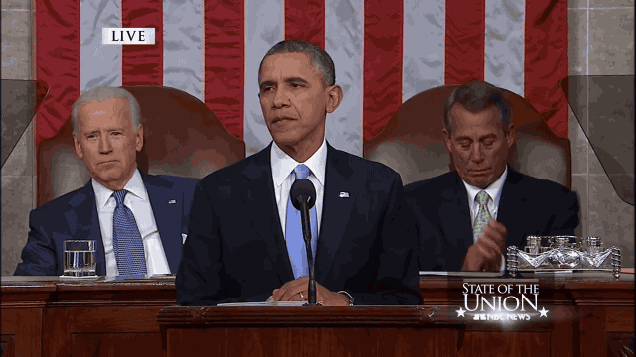
Résumé
- Vice President 2008-2016
- United States Senator from Delaware 1973-2009
- Chairman of Senate Foreign Relations Committee
- Chairman of Senate Judiciary Committee
- Chairman of International Narcotics Control Caucus
On The Issues
Social
- Biden’s abortion stance was a source of controversy during the 2012 presidential campaign. Biden, a devout Catholic, states that personally he was pro-life, but that he refused to impose this view on people of other religions. Biden also came out during 2012 as very much in support of same-sex marriage, a source of frustration for the President, who had not yet done so. Biden remains one of the few liberal candidates to stand firmly against the legalization of marijuana.
Fiscal
- Biden’s economic policies appear to fall in line with the President’s. Much of what he has said over the last eight years must be taken with a grain of salt due to his position, but he has repeatedly praised Obama’s economic decisions. Biden has been particularly effusive regarding Obama’s handling of the 2008 recession. Biden supports higher taxes on big business and the upper class.
Foreign Policy
- Biden can boast a strong foreign policy record, having been Chair of the Foreign Relations Committee for the Senate. Aside from that it’s hard to differentiate his foreign policy from that of the President, having little choice but to give his unwavering support throughout the last eight years. Biden has used vigorous rhetoric when discussing ISIS, however, and has stressed the importance of eliminating the organization.
Climate Change
- Biden has acknowledged that climate change is a very real phenomenon that has been caused by human activity.
Electability
- Biden is the consummate politician and a skilled speaker and campaigner. He may be the only candidate that truly has a chance at challenging Hillary. Biden is extremely likeable, and has been unanimously polling second to Hillary despite not having announced his candidacy yet. Therein lies the other issue: Biden has seemingly not yet decided if he will run. Although he has made several stops along the campaign trail, the decision remains unclear. Although he appears to have more than just political ambition as motivation, Biden is 72 years old and has just spent eight long years in the White House.
- Possibly the only man capable of having this much fun at the State of the Union.
.
Pretenders
Jim Webb
- The former senator from Virginia announced an exploratory committee but is yet to announce a formal campaign. Webb would appeal to socially-conservative Democrats, but is probably too far right for the party in this election. Once a promising young candidate within the party, Webb has not held public office since 2013.
Martin O’Malley
- The former Mayor of Baltimore and Governor of Maryland has mounted an impressive campaign thus far. O’Malley is borderline beloved by the party at this point for the sweeping liberal reform he has brought to Maryland. O’Malley, however, is not nearly as well known to the American public as other candidates. The fact that O’Malley has generated this much interest is a moral victory at this stage of his career. This election cycle may serve as a kickstarter to a future, more serious, run for the presidency for O’Malley.
Lincoln Chafee
- Chafee is an interesting case for the Democratic Party. He comes from a long line of Republicans and began his own career as a member of the GOP before eventually switching parties. The writing was on the wall as Chafee was the only Republican Senator to vote against the use of force to oust Saddam Hussein. Lincoln was briefly an Independent, serving as Obama’s campaign co-chair in 2012. Chaffee has no chance at the nomination, but adds character to the ho-hum Democratic race.
Alright, well I am exhausted, and I’m sure you are too. Rest up people, because the next 18 months are going to be quite interesting.
– Connor
**Note: Comments on this website are the sole responsibility of their writers and the writer will take full responsibility, liability, and blame for any libel or litigation that results from something written in or as a direct result of something written in a comment. The accuracy, completeness, veracity, honesty, exactitude, factuality and politeness of comments are not guaranteed.



